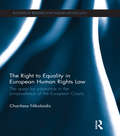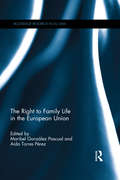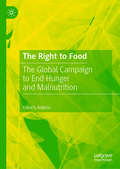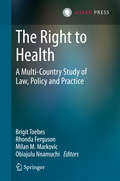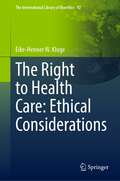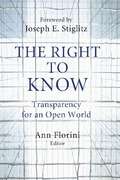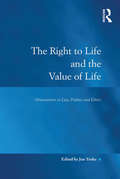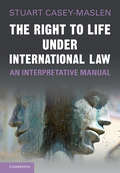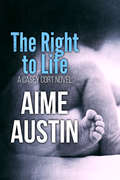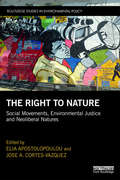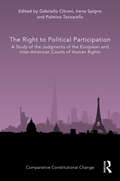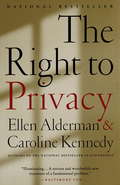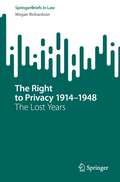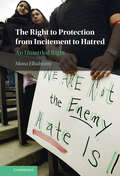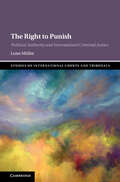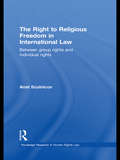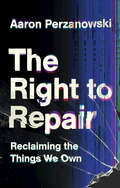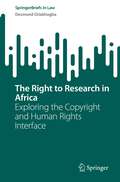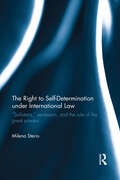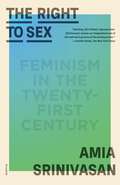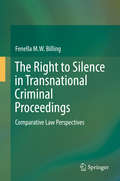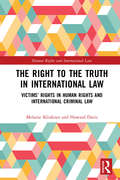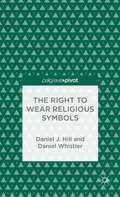- Table View
- List View
The Right to Equality in European Human Rights Law: The Quest for Substance in the Jurisprudence of the European Courts (Routledge Research in Human Rights Law)
by Charilaos NikolaidisA right to equality and non-discrimination is widely seen as fundamental in democratic legal systems. But failure to identify the human interest that equality aims to uphold reinforces the argument of those who attack it as morally empty or unsubstantiated and weakens its status as a fundamental human right. This book argues that an understanding of the human interest which equality aims to uphold is feasible within the jurisprudence of the European Court of Human Rights (ECtHR) and the European Court of Justice (ECJ). In comparing the evolution of the prohibition of discrimination in the case-law of both Courts, Charilaos Nikolaidis demonstrates that conceptual convergence within the European Convention on Human Rights (ECHR) and the EU on the issue of equality is not as far as it might appear initially. While the two bodies of equality law are extremely divergent as to the requirements they impose, their interpretation by the international judiciary might be properly analysed under a common light to emphasise the substantive dimension of equality in European Human Rights law. The book will be of great use and interest to scholars and students of human rights, discrimination law, and European politics.
The Right to Family Life in the European Union (Routledge Research in EU Law)
by Maribel González Pascual Aida Torres PérezExploring the main developments and challenges for the right to family life in the context of European integration, this book examines the right to family life in the EU Charter of Fundamental Rights and the interplay between family life, citizenship, and free movement; it analyzes the combined impact of the EU and the European Convention on Human Rights on the concept of the family protected by the law in light of recent case law. Considering the broadening understanding of what constitutes family, the challenges for the right to family life in the context of immigration, and the protection of families and social rights it provides a comprehensive overview of the current state of family life in the European Union.
The Right to Food: The Global Campaign to End Hunger and Malnutrition
by Francis AdamsThis book examines the global campaign to end hunger and malnutrition. Focus is placed on the work of the United Nations which has led international efforts to improve food security in the world’s poorest countries. The book first reviews the long-term project to establish access to safe, sufficient, and nutritious food as a universally recognized human right. This is followed by separate chapters that examine the nature and central causes of food insecurity in Latin America, Africa, the Middle East, and Asia. These chapters also review the contemporary work of three United Nations agencies – the World Food Programme, Food and Agriculture Organization, and International Fund for Agricultural Development – in providing both food aid and food assistance to each region of the developing world. This includes the provision of emergency food aid in response to natural disaster and civil conflict, as well as longer-term food assistance to promote agricultural productivity, advance rural development, and preserve natural environments. The concluding chapter considers ways to strengthen food aid and assistance in the years to come, with many of the recommendations advanced reflecting lessons learned from the actual experience of food aid and assistance described in this book.
The Right to Health
by Brigit Toebes Rhonda Ferguson Milan M. Markovic Obiajulu NnamuchiThis interdisciplinary study engages with the fields of human rights law, health law, and public health. It analyses how the internationally guaranteed human 'right to health' is realized by States at a national level. It brings together scholars from more than ten different countries, with each of them analyzing the right to health in their country or region. They all focus on a particular theme that is important in their country, such as health inequalities, the Millennium Development Goals, or the privatization of healthcare. This book is relevant for scholars, practitioners and policy makers in the field of human rights law, health law, public health and the intersection between these three fields.
The Right to Health Care: Ethical Considerations (The International Library of Bioethics #92)
by Eike-Henner W. KlugeThis book provides an in-depth ethical analysis of the right to health care by contrasting privatized with socialized approaches. It pays special attention to how a socialized approach can be implemented in the context of limited resources and offers a way of integrating allocation decisions at the policy level with institutional and hands-on decision-making. It also discusses how the right to health care translates into duties on part of the members of society. In an Appendix, it suggests how, in time of need, the TRIPS Agreement allows countries to side-step patent regulations that would otherwise raise the cost of patented healthcare products beyond what a particular society is able to afford. The book is of interest not only to scholars but also to healthcare policy makers, administrators and healthcare professionals, as well as to patients themselves.
The Right to Health at the Public/Private Divide
by Colleen M. Flood Aeyal GrossThrough a comparative global study of countries from all continents representing a diversity of health, legal, political, and economic systems, this book explores the role of health rights to advance greater equality through access to health care. Does health care promote equality, or does it in fact advance the opposite result? Does inserting the idea of "the right to health" into health systems allow the reinsertion of public values into systems that are undergoing privatization? Or does it allow for private claims to be rearticulated as "rights," in a way that actually reinforces inequality? This volume includes studies from countries such as the United States, the United Kingdom, Brazil, Canada, The Netherlands, China, and Nigeria, among many others, as well as authors with expertise regarding both the legal and health systems of their countries, making this a seminal study that allows readers to see the differing role of rights in various health systems.
The Right to Know: Transparency for an Open World (Initiative for Policy Dialogue at Columbia: Challenges in Development and Globalization)
by Ann FloriniThe Right to Know is a timely and compelling consideration of a vital question: What information should governments and other powerful organizations disclose? Excessive secrecy corrodes democracy, facilitates corruption, and undermines good public policymaking, but keeping a lid on military strategies, personal data, and trade secrets is crucial to the protection of the public interest. Over the past several years, transparency has swept the world. India and South Africa have adopted groundbreaking national freedom of information laws. China is on the verge of promulgating new openness regulations that build on the successful experiments of such major municipalities as Shanghai. From Asia to Africa to Europe to Latin America, countries are struggling to overcome entrenched secrecy and establish effective disclosure policies. More than seventy now have or are developing major disclosure policies or laws. But most of the world's nearly 200 nations do not have coherent disclosure laws; implementation of existing rules often proves difficult; and there is no consensus about what disclosure standards should apply to the increasingly powerful private sector. As governments and corporations battle with citizens and one another over the growing demand to submit their secrets to public scrutiny, they need new insights into whether, how, and when greater openness can serve the public interest, and how to bring about beneficial forms of greater disclosure. The Right to Know distills the lessons of many nations' often bitter experience and provides careful analysis of transparency's impact on governance, business regulation, environmental protection, and national security. Its powerful lessons make it a critical companion for policymakers, executives, and activists, as well as students and scholars seeking a better understanding of how to make information policy serve the public interest.
The Right to Life and the Value of Life: Orientations in Law, Politics and Ethics (Law, Justice And Power Ser.)
by Jon YorkeThis groundbreaking book is the first collection to investigate the law, political science and ethical perspectives collectively in relation to the right and value of life. Its contributions from international roster of scholars are organized around five themes: a theoretical positioning of life and death; War, armed conflict and detention; Death as punishment; Medical parameters for ending life; and medical policies for the preservation of life. In studying this issue in its contemporary contexts of "right" and "value," the volume fills the current scholarly lacuna in the general subject of the orientations of life. It presents a much-needed examination of key issues in a broad practical and theoretical context, and holds broad appeal for scholars, researchers, and students occupied with issues of war, armed conflict, the death penalty, and various contemporary medico-legal scenarios.
The Right to Life under International Law: An Interpretative Manual
by Stuart Casey-MaslenThe Right to Life under International Law offers the first-ever comprehensive treatment under international law of the foundational human right to life. It describes the history, content, and status of the right, considers jurisdictional issues, and discusses the application of the right to a wide range of groups, such as women, children, persons with disabilities, members of minorities, LGBTI persons, refugees, and journalists. It defines the responsibility of not only governments but also the private sector, armed groups, and non-governmental organisations to respect the prohibition on arbitrary deprivation of life. It also explains the nature and substance of the duty to investigate potentially unlawful death as well as the mechanisms at global and regional level to promote respect for the right to life.
The Right to Life: A Casey Cort Novel (Casey Cort Novel #6)
by Aime AustinWhat wouldn’t a woman do for her child? Ready to start a new practice free from the stress and moral ambiguity of criminal law, Casey Cort accepts lucrative referrals from the Hudson Adoption Agency. But when she’s ready to finalize a client’s first adoption, she learns the child’s origins aren’t all they seem. After escaping a brutal home life, Alile Rubidari is denied asylum in Britain. To avoid being deported to Africa, she ventures into the shady world of illegal au pairs… And discovers that her new young charge may be the child stolen from her. Without family, money, or legal status, Alile has no means to fight for her daughter. And the ambitious surgeon who claims to be the little girl’s adoptive mother is fighting to keep her at all costs. Caught in a battle of Biblical proportions, Casey prays for the wisdom of Solomon because both women will do anything for their daughter, but a judge can only choose one mother. In this continuation of the Casey Cort series, Aime Austin—a former trial lawyer in Cleveland—weaves a tale that blends the best of today’s top legal thrillers with the heart and soul of women’s fiction, in a story ripped from real-world headlines.
The Right to Nature: Social Movements, Environmental Justice and Neoliberal Natures (Routledge Studies in Environmental Policy)
by Elia Apostolopoulou Jose A. Cortes-VazquezSince the 2008 financial crash the expansion of neoliberalism has had an enormous impact on nature-society relations around the world. In response, various environmental movements have emerged opposing the neoliberal restructuring of environmental policies using arguments that often bridge traditional divisions between the environmental and labour agendas. The Right to Nature explores the differing experiences of a number of environmental-social movements and struggles from the point of view of both activists and academics. This collection attempts to both document the social-ecological impacts of neoliberal attempts to exploit non-human nature in the post-crisis context and to analyse the opposition of emerging environmental movements and their demands for a radically different production of nature based on social needs and environmental justice. It also provides a necessary space for the exchange of ideas and experiences between academics and activists and aims to motivate further academic-activist collaborations around alternative and counter-hegemonic re-thinking of environmental politics. This book will be of great interest to students, scholars and activists interested in environmental policy, environmental justice, social and environmental movements.
The Right to Political Participation: A Study of the Judgments of the European and Inter-American Courts of Human Rights (Comparative Constitutional Change)
by Gabriella Citroni, Irene Spigno, and Palmina TanzarellaThis book provides a comparative analysis of how judgments from the European Court of Human Rights (ECtHR) and the Inter-American Court of Human Rights (IACtHR) affect political participation and electoral justice at the national level. Looking at specific countries, the work analyses the legal impact the implementation of the ECtHR and the IACtHR judgments has, with a specific focus on cases in which the regional court concerned uses the “democratic argument,” that is, an argument related to democracy and political rights. The reasoning is that, although democracy is a much wider concept, judgments concerning violations of political rights and electoral justice provide reliable indicators to assess the status and sustainability of democracy in a State. Moreover, the analysis of the violations of political rights and electoral justice allows an in-depth comparison between the two regional human rights systems. Mindful of the broader scope of the fall-out generated by the non-implementation of judgments, including in socio-economic terms, the book includes a section exploring how judgments issued by the ECtHR and the IACtHR affect voters’ participation in the countries under their jurisdiction. To this end, an original dataset including the 47 Member States of the Council of Europe and the 20 countries which recognised the adjudicatory jurisdiction of the IACtHR is built. Multidisciplinary in aim and scope of analysis, the book will be an invaluable resource for researchers, academics, and policy-makers working in the areas of constitutional law, international human rights law, and political economy.
The Right to Privacy
by Caroline Kennedy Ellen AldermanCan the police strip-search a woman who has been arrested for a minor traffic violation? Can a magazine publish an embarrassing photo of you without your permission? Does your boss have the right to read your email? Can a company monitor its employees' off-the-job lifestyles--and fire those who drink, smoke, or live with a partner of the same sex? Although the word privacy does not appear in the Constitution, most of us believe that we have an inalienable right to be left alone. Yet in arenas that range from the battlefield of abortion to the information highway, privacy is under siege. In this eye-opening and sometimes hair-raising book, Alderman and Kennedy survey hundreds of recent cases in which ordinary citizens have come up against the intrusions of government, businesses, the news media, and their own neighbors. At once shocking and instructive, up-to-date and rich in historical perspective, The Right to Private is an invaluable guide to one of the most charged issues of our time."Anyone hoping to understand the sometimes precarious state of privacy in modern America should start by reading this book."--Washington Post Book World"Skillfully weaves together unfamiliar, dramatic case histories...a book with impressive breadth."--TimeFrom the Trade Paperback edition.
The Right to Privacy 1914–1948: The Lost Years (SpringerBriefs in Law)
by Megan RichardsonThe book offers a provocative review of thinking about privacy and identity in the years encompassing and disrupted by the two world wars of the first half of the twentieth century – focusing (in particular) on the socio-technological transformations associated with modernism. It argues that, with many of the most interesting modern thinkers of the period dead or marginalised (or both) by 1948, their ideas about how rights such as privacy should develop to accommodate the exigencies of modern life failed to find much of a voice in the drafting of the Universal Declaration of Human Rights. Yet they anticipated in surprising ways some of our ‘new’ ways of thinking in more recent times. After a brief introduction, the chapters are framed in terms of case studies on the right to privacy, the right to data protection and the right to be forgotten, each finishing with a consideration of how these rights require further rethinking in the digital century.
The Right to Protection from Incitement to Hatred: An Unsettled Right
by Mona ElbahtimyAgainst the backdrop of the new globalized hate speech dynamics, the nature and scope of States' obligations pursuant to international human rights law on prohibiting incitement to hatred have taken on increased importance and have become a controversial issue within multilateral human rights diplomacy. Key questions being posed in the on-going debates over how best to respond to the new wave of hatred include whether the international legal norm against incitement to hatred, as it currently stands, is suitable to address the contemporary challenges of this phenomenon. Alternatively, does it need to be developed further? This book traces the journey of this norm in three analytical domains; its emergence, relevant supranational jurisprudence, and the recent standard-setting attempts within the UN. The book argues that five internal features of the norm had a strong influence on its difficult path within international human rights law.
The Right to Punish: Political Authority and International Criminal Justice (Studies on International Courts and Tribunals)
by Luise MüllerWhat gives international courts the authority to punish individuals for international crimes? Through the lens of political philosophy, Luise Müller provides an original perspective on the justification of the authority of international criminal courts and tribunals. She argues that institutions of international criminal justice are permitted to pierce the sovereignty of states in order to punish high-profile politicians for genocide, crimes against humanity, war crimes, and other mass human rights violations. Their right to punish is justified by virtue of their function to deter mass violations of fundamental human rights. However, to legitimately exercise that right, international criminal justice institutions must fulfil two conditions: first, they must conduct criminal trials with the highest level of fairness; second, they must treat those who are subject to their authority as equals. This last condition can be satisfied by international criminal justice institutions by including procedures of democratic decision-making and democratic accountability.
The Right to Religious Freedom in International Law: Between Group Rights and Individual Rights (Routledge Research In Human Rights Law Ser. #2)
by Anat ScolnicovThis book analyses the right to religious freedom in international law, drawing on an array of national and international cases. Taking a rigorous approach to the right to religious freedom, Anat Scolnicov argues that the interpretation and application of religious freedom must be understood as a conflict between individual and group claims of rights, and that although some states, based on their respective histories, religions, and cultures, protect the group over the individual, only an individualistic approach of international law is a coherent way of protecting religious freedom. Analysing legal structures in a variety of both Western and Non-Western jurisdictions, the book sets out a topography of different constitutional structures of religions within states and evaluates their compliance with international human rights law. The book also considers the position of women's religious freedom vis-à-vis community claims of religious freedom, of children’s right to religious freedom and of the rights of dissenters within religious groups.
The Right to Repair: Reclaiming the Things We Own
by Aaron PerzanowskiIn recent decades, companies around the world have deployed an arsenal of tools - including IP law, hardware design, software restrictions, pricing strategies, and marketing messages - to prevent consumers from fixing the things they own. While this strategy has enriched companies almost beyond measure, it has taken billions of dollars out of the pockets of consumers and imposed massive environmental costs on the planet. In The Right to Repair, Aaron Perzanowski analyzes the history of repair to show how we've arrived at this moment, when a battle over repair is being waged - largely unnoticed - in courtrooms, legislatures, and administrative agencies. With deft, lucid prose, Perzanowski explains the opaque and complex legal landscape that surrounds the right to repair and shows readers how to fight back.
The Right to Research in Africa: Exploring the Copyright and Human Rights Interface (SpringerBriefs in Law)
by Desmond OriakhogbaThis book formulates a human right to research in Africa based on an in-depth examination of the available international and regional human rights instruments as well as those relevant to the national contexts of African countries. The imbalances in the African copyright ecosystem regarding access to information for research and education became painfully apparent during the COVID-19 pandemic. African libraries and knowledge curators found themselves ill-equipped to perform their role of enabling access to information. As teaching, learning and research are increasingly done on digital platforms, learners and researchers continue to grapple with the challenges of accessing materials owing largely to the protection of these resources under copyright law. Access to information, which is needed in order to exercise the right to science and culture, faces a significant challenge posed by the exercising of exclusive rights by copyright owners without a legal mechanism that properly balances copyright from a human rights perspective.To achieve such a balance, there is an urgent need to revise the African copyright system from the perspective of human rights law. Can it be done by establishing a human right to research? In view of the existing broad freedom of expression, and the right to science and culture, education, and property in global, national and regional human rights regimes, is a specific right to research in Africa necessary and justifiable? If so, what should its minimum core components be? Are there international and national regimes already in place that could support the formulation of a human right to research in Africa?This book offers a valuable resource for law- and policymakers in the fields of copyright and human rights, judges, lawyers, public interest groups, researchers and students, librarians and authors, as well as the general public.
The Right to Self-determination Under International Law: “Selfistans,” Secession, and the Rule of the Great Powers (Routledge Research in International Law)
by Milena SterioThis book proposes a novel theory of self-determination; the Rule of the Great Powers. This book argues that traditional legal norms on self-determination have failed to explain and account for recent results of secessionist self-determination struggles. While secessionist groups like the East Timorese, the Kosovar Albanians and the South Sudanese have been successful in their quests for independent statehood, other similarly situated groups have been relegated to an at times violent existence within their mother states. Thus, Chechens still live without significant autonomy within Russia, and the South Ossetians and the Abkhaz have seen their conflicts frozen because of the peculiar geo-political equilibrium of power within the Caucuses region. The Rule of the Great Powers, which asserts that only those self-determination seeking entities which enjoy the support of the majority of the most powerful states (the Great Powers) will ultimately have their rights to self-determination fulfilled. The Great Powers, potent military, economic and political powerhouses such as the United States, China, Russia, Japan, the United Kingdom, France, Germany, and Italy, often dictate self-determination outcomes through their influence in global affairs. Issues of self-determination in the modern world can no longer be effectively resolved through the application of traditional legal rules; rather, resort must be had to novel theories, such as the Rule of the Great Powers. This book will be of particular interest to academics and students of law, political science and international relations.
The Right to Sex: Feminism in the Twenty-First Century
by Amia Srinivasan“Laser-cut writing and a stunning intellect. If only every writer made this much beautiful sense.”—Lisa Taddeo, author of Three Women“Amia Srinivasan is an unparalleled and extraordinary writer—no one X-rays an argument, a desire, a contradiction, a defense mechanism quite like her. In stripping the new politics of sex and power down to its fundamental and sometimes clashing principles, The Right to Sex is a bracing revivification of a crucial lineage in feminist writing: Srinivasan is daring, compassionate, and in relentless search of a new frame.”—Jia Tolentino, author of Trick Mirror: Reflections on Self DelusionThrilling, sharp, and deeply humane, philosopher Amia Srinivasan's The Right to Sex: Feminism in the Twenty-First Century upends the way we discuss—or avoid discussing—the problems and politics of sex.How should we think about sex? It is a thing we have and also a thing we do; a supposedly private act laden with public meaning; a personal preference shaped by outside forces; a place where pleasure and ethics can pull wildly apart.How should we talk about sex? Since #MeToo many have fixed on consent as the key framework for achieving sexual justice. Yet consent is a blunt tool. To grasp sex in all its complexity—its deep ambivalences, its relationship to gender, class, race and power—we need to move beyond yes and no, wanted and unwanted.We do not know the future of sex—but perhaps we could imagine it. Amia Srinivasan’s stunning debut helps us do just that. She traces the meaning of sex in our world, animated by the hope of a different world. She reaches back into an older feminist tradition that was unafraid to think of sex as a political phenomenon. She discusses a range of fraught relationships—between discrimination and preference, pornography and freedom, rape and racial injustice, punishment and accountability, students and teachers, pleasure and power, capitalism and liberation.The Right to Sex: Feminism in the Twenty-First Century is a provocation and a promise, transforming many of our most urgent political debates and asking what it might mean to be free.
The Right to Silence in Transnational Criminal Proceedings
by Fenella M. W. BillingThis book considers the effectiveness and fairness of using international cooperation to obtain confession evidence or evidence of a suspect or accused person's silence across borders. This is a question of balance in limiting and protecting the right to silence. The functioning of the applicable law in Denmark, England and Wales and Australia is analysed in relation to investigative and trial measures such as police questioning, administrative questioning powers, covert surveillance and the use of silence as evidence of guilt. On the national level, this work examines the way in which domestic rules balance the right to silence in national criminal proceedings, and whether investigative and trial rules produce continuity throughout the criminal proceedings as a whole. From the transnational perspective, comparative legal analysis is used to determine whether the national continuity may be disrupted to such an extent that cooperation in the gathering of confession evidence causes unfairness. From the international perspective, this research compares the right to silence under the ICCPR and the ECHR to identify the overall effect of cooperating under particular human rights frameworks on the question of balance.
The Right to Silence in Transnational Criminal Proceedings: Comparative Law Perspectives
by Fenella M. BillingThis book considers the effectiveness and fairness of using international cooperation to obtain confession evidence or evidence of a suspect or accused person’s silence across borders. This is a question of balance in limiting and protecting the right to silence. The functioning of the applicable law in Denmark, England and Wales and Australia is analysed in relation to investigative and trial measures such as police questioning, administrative questioning powers, covert surveillance and the use of silence as evidence of guilt.On the national level, this work examines the way in which domestic rules balance the right to silence in national criminal proceedings, and whether investigative and trial rules produce continuity throughout the criminal proceedings as a whole. From the transnational perspective, comparative legal analysis is used to determine whether the national continuity may be disrupted to such an extent that cooperation in the gathering of confession evidence causes unfairness. From the international perspective, this research compares the right to silence under the ICCPR and the ECHR to identify the overall effect of cooperating under particular human rights frameworks on the question of balance.
The Right to The Truth in International Law: Victims’ Rights in Human Rights and International Criminal Law (Human Rights and International Law)
by Howard Davis Melanie KlinknerThe United Nations has established a right to the truth to be enjoyed by victims of gross violations of human rights. The origins of the right stem from the need to provide victims and relatives of the missing with a right to know what happened. It encompasses the verification and full public disclosure of the facts associated with the crimes from which they or their relatives suffered. The importance of the right to the truth is based on the belief that, by disclosing the truth, the suffering of victims is alleviated. This book analyses the emergence of this right, as a response to an understanding of the needs of victims, through to its development and application in two particular legal contexts: international human rights law and international criminal justice. The book examines in detail the application of the right through the case law and jurisprudence of international tribunals in the human rights and also the criminal justice context, as well as looking at its place in transitional justice. The theoretical foundations of the right to the truth are considered as well as the various objectives appropriate for different truth-seeking mechanisms. The book then goes on to discuss to what extent it can be understood, constructed and applied as a hard, legally enforceable right with correlating duties on various people and institutions including state agencies, prosecutors and judges.
The Right to Wear Religious Symbols
by Daniel J. Hill Daniel WhistlerClearly presenting the case-law concerning Article 9 of the European Convention of Human Rights, this is a lively and accessible analysis of a key issue in contemporary society: whether there is a human right to wear a religious symbol and how far any such right extends.
